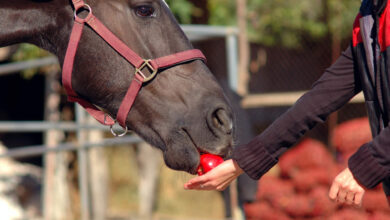Can Horses Eat Chocolate? The Dangers of Cocoa for Horses
Chocolate Cravings Can Quickly Turn Deadly for Horses - The Lethal Dangers of Cocoa for Equine Health

Can Horses Eat Chocolate? Chocolate may be an irresistible indulgence for humans, but for horses, this sweet treat can be deadly. Sarah, as you all know her, still remembers the panic she felt when she discovered her horse, Dixie, in the barn with an open box of chocolate candies.
Before Sarah could react, Dixie had consumed almost a dozen chocolates. Within minutes, the horse began panting and sweating – telltale signs of chocolate poisoning.
Chocolate contains both cocoa and a compound called theobromine, which is toxic to horses. Theobromine affects the heart, central nervous system, and kidneys, according to veterinary experts at the ASPCA Pet Poison Control Center – a leading authority on chocolate poisoning treatment.
Even small amounts found in dark chocolate can cause reactions, while milk chocolate with less cocoa may require large doses to make a horse sick.
Still, all forms of chocolate should be kept far away from horses.
Symptoms of chocolate poisoning include
- Increased heart rate
- Labored breathing
- Hyperactivity and skittish behaviour
- Muscle tremors or seizures
- Increased urination or colic
Veterinarians at UC Davis Veterinary Medicine – top researchers on horse health – state that the toxic dose depends on the animal’s size and the type of chocolate.
For an average 1,000 lb. horse, as little as 0.5 oz of baker’s chocolate can be fatal. Dark chocolate and cocoa powder are more dangerous, while milk chocolate requires larger amounts upwards of 1 oz per pound of body weight to make a horse sick.
The key is keeping all chocolate out of reach of horses, as even “safe” chocolate can be toxic in large quantities. Sarah learned this lesson with Dixie, who thankfully recovered after receiving prompt veterinary treatment.
However, the prevalence of chocolate poisoning in horses is unfortunately high. According to the ASPCA, chocolate ingestion ranks in the top 10 reasons for calls to their emergency hotline.
Clearly, horse owners must take precautions to prevent this potentially fatal accident.
Killer Candy: Is Chocolate a Death Sentence for Horses?
Horses cannot properly digest chocolate due to their physiology. According to veterinary toxicology experts, horses lack the enzyme needed to metabolize theobromine, the toxic compound abundant in cocoa products.
This makes chocolate up to ten times more poisonous to horses than humans.
Without this enzyme, theobromine is absorbed directly into the bloodstream, causing harmful effects throughout the body:
- Theobromine stimulates the heart and cardiovascular system. It can cause arrhythmias, an accelerated heart rate, hypertension, and even cardiac arrest.
- It also acts as a stimulant in the central nervous system. Theobromine poisoning can cause overexcitement, tremors, seizures, and death from respiratory paralysis.
- Finally, the kidneys are affected. The toxins cause severe diuresis, bloody urine, and kidney failure.
According to veterinarians at the ASPCA Pet Poison Control Center, a leading authority on chocolate poisoning, these conditions can develop rapidly after a horse eats chocolate.
Symptoms usually occur within 1-4 hours and require prompt veterinary treatment.
How to Remove Chocolate Poisoning in Horses?
To treat chocolate poisoning, vets immediately induce vomiting to remove any remaining chocolate from the stomach.
Activated charcoal may be administered to absorb toxins, along with IV fluids to flush out the kidneys. Supportive care, like anti-seizure medication, rehydration therapy, and monitoring heart rate and rhythm are crucial during recovery.
Despite conventional treatment, the long-term prognosis depends on the amount consumed and how quickly care was provided.
Some horse owners try folk remedies like strong coffee or baking soda when chocolate poisoning occurs. However, these have no proven benefits and may actually harm the horse by delaying proper veterinary treatment.
The best approach is calling a vet immediately if chocolate ingestion is suspected.
Prevention is key when it comes to horses and chocolate. Keep all chocolate, cocoa, and baking goods containing chocolate safely stored away from the barn or pasture.
Monitor grazing areas, as cacao bean shells are occasionally found in fields near chocolate manufacturing facilities.
Be especially vigilant around holidays when chocolate may be given as gifts around horses. With proper care and caution, horse lovers can keep their animals safe from the dangers of chocolate.
Read More: Can Horses Eat Apples?
The Sour Truth About Giving Sweet Treats to Horses
For a horse suffering chocolate poisoning, recovery depends on the amount consumed and how rapidly treatment was provided.
With aggressive veterinary care, many horses make a full recovery without lasting effects.
Supportive care is essential, including:
- Intravenous fluids to prevent dehydration and flush toxins
- Medications to control heart rate and blood pressure
- Anti-seizure drugs to prevent or stop tremors and seizures
- Rest and monitoring in a quiet environment
The goal is to maintain normal bodily functions while the chocolate passes through the system. With prompt veterinary treatment, most horses begin showing improvement within 24 hours.
However, in severe cases or if treatment is delayed, chocolate can cause irreversible damage. Theobromine’s effects on the kidneys and heart can result in permanent problems like:
- Reduced kidney function
- Cardiac arrhythmias
- Neurological deficits
Horses may require lifelong medical management after chocolate poisoning depending on their residual effects. Prevention is certainly ideal over dealing with lasting health issues.
What to do When Your Horse Eats Chocolate
If you suspect your horse has eaten chocolate, quick action is critical:
- Contact your veterinarian or poison control immediately
- Remove any remaining chocolate so no more is ingested
- Check vital signs like temperature, pulse, and respiration
- Watch your horse closely for symptoms of poisoning
- Follow your veterinarian’s treatment recommendations
The faster treatment begins, the better the outlook for your horse’s recovery. “I came home to find half my daughter’s Valentine’s chocolate missing, and the empty box in the pasture where my horse, Bella, was grazing,” says Lindsay K. of Texas.
“Thankfully the vet was able to make her vomit most of it up before it was absorbed. She was back to normal in a couple days.”
While chocolate should always be avoided, horse owners can look for safer “treats” to spoil their animals:
- Fresh fruits like apples and carrots
- Oats and commercial horse cookies
- Salt licks and mineral blocks
- Sugar-free mints (in moderation)
By selecting horse-appropriate snacks, we can show our horses some love without risking their health and safety.
Chocolate and horses simply don’t mix well, no matter how much they may enjoy the taste. Avoiding candy and other sweets is the best policy when it comes to equine treat time.



